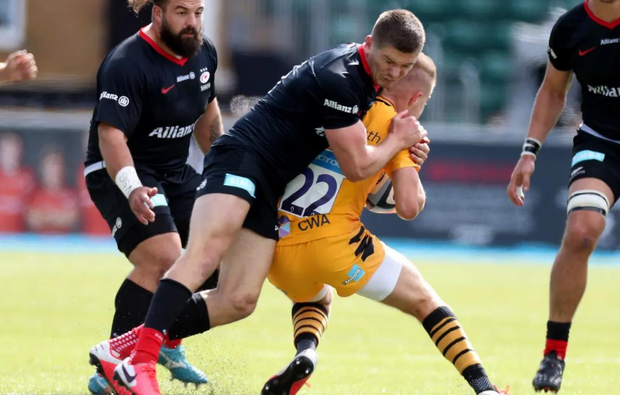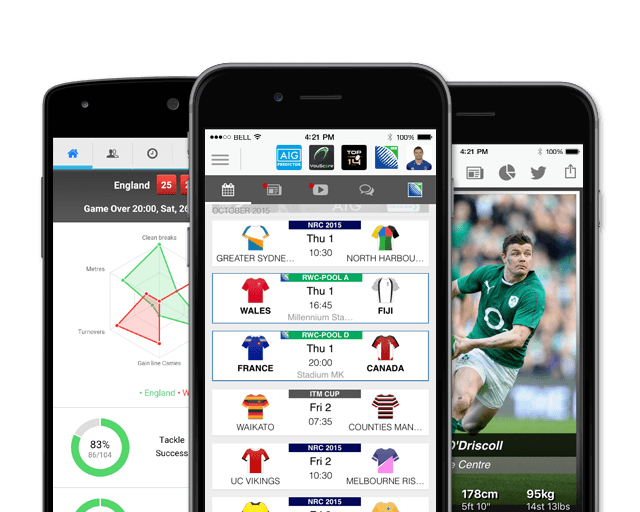World Rugby Coaching Intervention Program changing tackle behavior
- 1690

- Coaching Intervention Programme is part of a suite of measures aimed at reducing the risk of head contact in rugby
- 73 per cent of HIA events in elite rugby caused by the tackle
- More than 100 players have successfully completed the programme since its introduction in 2021
- Less than six per cent of players re-offend following the programme
- Positive feedback by participating coaches and players
- Learnings proving valuable for wider squad preparation, not simply individual technique interventions
World Rugby’s Coaching Intervention Programme has been adopted into regulation after an initial global pilot successfully demonstrated positive player and coach behaviour change.
Since its launch in July 2021, more than 100 players have successfully completed the programme which is designed to reduce head contact by incentivising players and coaches to practice tackle technique that carries a statistically lower injury risk, reducing the number of red cards over time.
Under the programme, any player in elite rugby around the world* who has been sanctioned for the first time by a disciplinary panel for foul play involving contact with the head may apply to substitute the final week/match of their sanction for a coaching intervention.
With the sport united in its unwavering commitment to player welfare, the latest statistics demonstrate that repeat offences are below 10 per cent, highlighting the importance of technique to both welfare and performance outcomes.
- Programme aims to help reduce head contact by reducing the risk of foul play caused by poor technique
- Coach and player behaviour change leading to positive outcomes
- Programme overseen by expert panel of coaches, match officials and former players
- 120 players have now successfully completed the programme
- 94 per cent of players who have completed the programme have not repeat offended
The tackle accounts for 73 per cent of head injury assessment events in the elite game of which 76 per cent occur to the tackler. The risk of concussion is more than four times greater when the tackler is upright in the tackle. Ingraining the importance of better (lower) tackle technique across the game, along with strong on-field sanctions and continual law evolution, it is possible to achieve stronger welfare outcomes. The Coaching Intervention Programme is central to this approach.
World Rugby Chief Executive Alan Gilpin said: “As a sport, our mission is to reduce the frequency of head impacts in both game and training environments and we are approaching this through education, law amendments and tough sanctions.
“Since its launch, the Coaching Intervention Programme has challenged coaches to think about tackle technique and safety, and lessons learned from these cases can be applied to every player, creating a benefit for all players in the game. The behavioural statistics and feedback have been overwhelmingly positive.
“It is important to state that we are not saying that head contact is exclusively a player technique issue, as we will continue to work tirelessly to reduce the risk via law amendments and education, but good technique certainly contributes to reduced head injury risk, and we are encouraged that the players and coaches share this view.”
World Rugby Director of Rugby Phil Davies added: “From a coaching perspective, the tackle is fundamental to successful outcomes and practicing good tackle technique can have welfare and performance benefits. Programmes such as the Coaching Intervention Programme have enormous education and behaviour benefits and are as important to the coach as they are the player.
“The Coaching Intervention Programme is by no means a tick box exercise. In order to benefit from a shorter suspension, the coaching intervention must be a targeted and technique-focused measure, designed to analyse tackle/contact technique and identify and implement positive modifications. We want to change the player’s behaviour and ultimately reduce the risk of injury to themselves and opponents. This intervention is reviewed and overseen by an independent expert coaching review group and can only be undertaken once per player. Of the 100 plus players who have been through the programme, eight have had further red cards. Those players can’t apply twice, and they will generally then receive longer suspensions from the judicial process as a repeat offender.
“What we have seen in the 100 plus examples to date is a huge amount of transformative work being undertaken by participants and a genuine openness to change technique because of both the welfare and performance benefits of keeping players fit and on the field.”
The programme has attracted positive feedback from participants, who have benefitted from the interventions to address tackle technique.
Leicester Tigers player Dan Kelly said: “I was glad I was able to take part in the Coaching Intervention Programme. It's improved me as a player, and I think now, after doing the intervention, I'm better technically and overall, it's bettered my game.”
Connacht coach Colm Tucker added: “I found the intervention opportunity really worthwhile. Following a player incident and subsequent one-to-one review, we began a three-step process and six-week plan on the back of our findings. It was also very beneficial to have open dialogue with the independent assessor who I was able to speak with through the process.”
The RFU’s Head of Discipline David Barnes added: “The Coaching Intervention Programme is a welcome addition to the sanctioning process with the ability to educate and correct technique alongside any match bans. This process, which should help reduce future incidents of foul play, is another positive way of impacting on player welfare in the game.”
* The initiative is open to leagues/competitions offering the highest levels of player welfare by utilising the HIA process. This ensures a consistency in the approach, and quality of footage for the review process.











